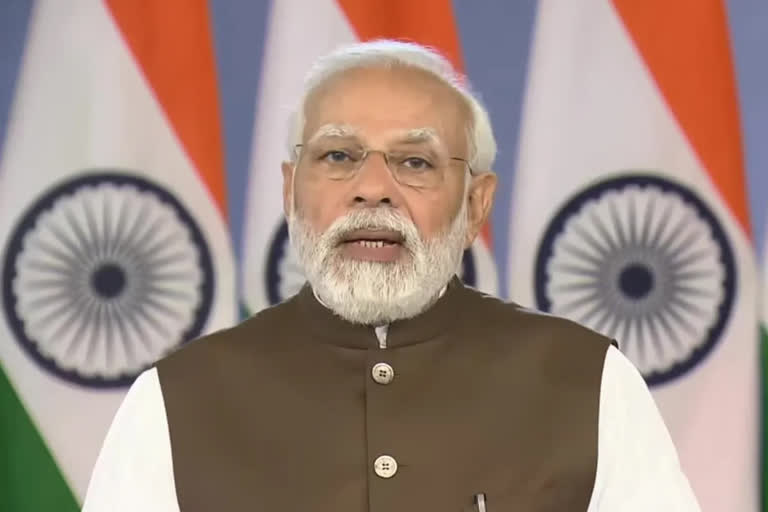Panaji:Prime Minister Narendra Modi on Friday said his government provided piped water connection to seven crore rural families in the last three years under the Jal Jeevan Mission, which helped the country achieve the milestone of 10 crore such connections in villages so far. Describing water security as one of the biggest issues being faced globally, he said it could prove to be a major challenge for the country in its march towards 'Viksit Bharat' (developed India).
Apparently targeting the Congress, Modi said those who were not bothered about the present and future of the country only talked about water conservation, but never took any steps to address the issue. He was addressing via video link a programme organised by the Goa government to mark 100 per cent piped water supply coverage in rural households of the state.
Union Minister of Jal Shakti Gajendra Singh Shekhawat and Goa Chief Minister Pramod Sawant were present for the function in Panaji. "In the seven decades since Independence, only three crore rural households had piped water connection. But in the last three years, since this mission was announced, our government has connected seven crore additional rural households through tap water," Modi said.
"The achievement of the 10 crore milestone reflects the Centre's commitment towards provision of water and preservation of the environment," he added. Modi said that when he made the announcement of Jal Jeevan Mission, there were 16 crore rural families that were dependent on other sources of water.
"We could not keep such a big population struggling," he added. He said that Har Ghar Jal Mission has four important pillars - people's participation, partnership of stakeholders, political will and optimum utilisation of resources. The country has achieved three important milestones, including the 10 crore piped water connections in rural parts, he said.
Secondly, Goa along with union territories of Dadra and Nagar Haveli and Daman and Diu have become parts of the country with 100 per cent piped water coverage. In the days to come, many other states will also join the list of hundred percentage coverage, he said. The third achievement of the country was linked to the Swachh Bharat Abhiyaan, he said.
"Some years back, the country had become open defecation (ODF) free and we took the mission of ODF plus. The country today has achieved a major milestone. More than one lakh villages in the country have become ODF plus. We should congratulate all the states and villages which achieved these milestones," he said.
An ODF plus village is defined as a village which sustains its ODF status, ensures solid and liquid waste management and is visually clean, officials said. "Globally, water security is one of the biggest challenges and countries are working to tackle it. Water security could be a big challenge for India's march towards 'Viksit Bharat'," the PM said, adding that his government has taken up this challenge by working round the clock.
"You don't have to strive much to form a government, but you need to put in great efforts to build a country," he added. Taking a dig at the Opposition, Modi said those who were not bothered about the present and future of the country could just talk about water conservation, but never took any steps to address the issue.
"Since the last eight years, we have been working to ensure that water scarcity does not become an impediment in the process of nation building," he said. There is a positive outcome due to various initiatives taken by the government, he said, adding, "There is a report that wetland sites in the country have increased to 75, of which 50 were added in the last eight years."
The PM said that his government created the Jal Shakti Ministry, which has been dedicatedly working towards water conservation and its security in the country. Officials of the ministry and the state governments did not stop their work even during the pandemic situation, which is now showing results.
Women are the biggest beneficiaries of the Har Ghar Jal scheme. It also strengthens our fight against malnourishment, he said.
"That is why women are the focus of this mission. Their time is saved and the families are saved from diseases that they used to suffer due to consumption of contaminated water," he said.
Under this mission panchayats and gram sabhas are roped in and villagers are given various responsibilities. The villagers are involved in laying of pipelines, pricing and even quality control of the water that is supplied to households, he said. Political will is also an important pillar for this mission. The work which could not be achieved in the last 70 years has been achieved in the last three years, he said. The prime minister said that there is no goal that Indians set but did not achieve. (PTI)
